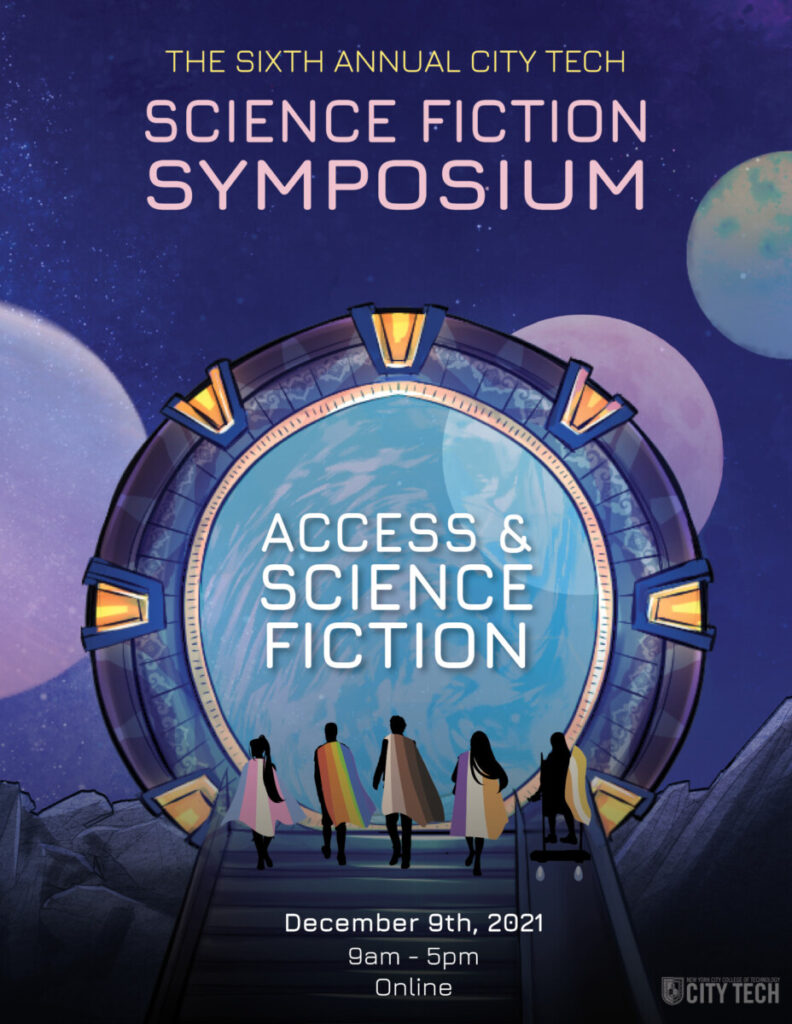
The Sixth Annual City Tech Science Fiction Symposium on the topic of Access and SF was held on Thursday, Dec. 9, 2021 as a Zoom Webinar. You can read the full program here.
Included below are videos of each session as well as links to expanded presentations .
Many thanks again to everyone who participated and contributed to this year’s event!
Opening
Jason W. Ellis
Justin Vazquez-Poritz
Paper Session 1: Access to International SF
Jill Belli – Moderator
Emrah Atasoy – “Access to SF in Turkey and Turkish SF Abroad”
Shanky Chandra – “Chinese Science Fiction: A Literary Genre, A Tool of Teaching Science or A Secret Weapon of China’s Soft Power?”
Gillian Polack – “The Problem of Susan Australia, or, The Tyranny of Distance” | Watch Expanded Presentation
Paper Session 2: Access to Science/Fiction/World
A. Lavelle Porter – Moderator
Chris Leslie – “Reevaluating the Inclusiveness of the Interstellar Republic of Letters”
Katherine Buse and Anastasia Klimchynskaya – “Science Fiction and Citizen Science”
Aaron Zwintscher – “Star Wars Biomes: Simulacra, Nature, and Passivity in No Dialogue Nature Shows”
Discussion Panel: “Accessing the Feminist Science Fiction Archive, Or, Young Women Read Old Feminist SF”
Lisa Yaszek – Moderator
Panelists:
Josie Benner
Olivia Kiklica
Jessica Taetle
Edeliz Zuleta
Paper Session 3: Access, Inclusion, and Representation in SF
Joy Sanchez-Taylor – Moderator
Leigh Gold – “Confronting Language in the Science Fiction Text: Language, Access, and Trauma in Octavia Butler and Ursula K Le Guin”
Katherine Pradt – “Shipping Supergirl: Discovering and Defending Lesbian Identity Through a DC Fandom”
Sean Scanlan – “Cool Access and Access to Cool: Gibson’s Gun Moll, Dorotea Benedetti”
Ida Yoshinaga – “Corporate Employment Practices Towards Greater Diversity of Story Development for SFF Screen Stories”
Paper Session 4: Access, Accessibility, Bodies, and Minds in SF
Lucas Kwong – Moderator
Jacob Adler – “‘Everything Herein is Fantastic’: Accessibility and Inclusivity in Dungeons & Dragons”
Ryan Collis – “Autistic Speculative Imaginings: Accessing and Creating Minor Literatures”
Annette Koh – “Urban Planning for Cyborg Cities: Thinking about disabilities and mobilities in sci-fi as an urban planner”
Analog Writers Panel and the Analog Emerging Black Voices Award
Emily Hockaday – Moderator
Panelists
Alec Nevala-Lee
Marie Vibbert
Chelsea Obodoechina
Trevor Quachri and Emily Hockaday – Award Presentation
Keynote: “Writing Ourselves In: Teaching Writing and Science Fiction with Wikipedia”
Ximena Gallardo C. and Ann Matsuuchi
Wanett Clyde – Introduction and Moderator
Leading up to this special keynote event, everyone is invited to join the Opening Access to SF: City Tech Science Fiction Edit-a-thon 2021 Dec. 6-Dec. 10.
Ximena and Ann’s book chapter, “My Books Will Be Read By Millions of People!”: The LaGuardia Community College Octavia E. Butler Wikipedia Project,” that appears in Approaches to Teaching the Works of Octavia Butler, edited by Tarshia Stanley (Modern Language Association, 2019), has been made accessible via the CUNY institutional repository, Academic Works: https://academicworks.cuny.edu/lg_pubs/141/. This book was awarded Idaho State University’s 2021 Teaching Literature Award.



